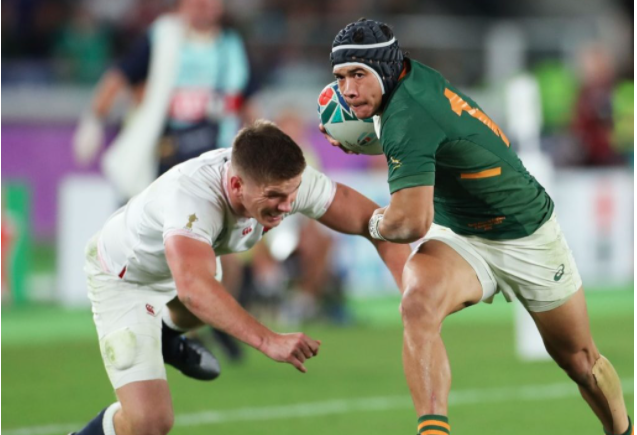Cheslin Kolbe recalls his journey to Springbok greatness and what was running through his head in the lead-up to his game-winning try in the 2019 Rugby World Cup final.
Read: ‘Lions tour needs to go ahead this year’
In the final quarter of the game, Kolbe collected a loose ball from Pieter-Steph du Toit after a thunderous tackle by Malcom Marx dislodged possession from Englishman Henry Slade.
Chatting to Alex Payne and former England international James Haskell, Kolbe reflected on that unforgettable moment.
‘I got the ball at full pace and went on the goose [step] because I saw two forwards covering across and I just backed my pace on the outside.’
The Springbok wing then easily coasted past the covering Joe Marler to set up a one-on-one with England captain Owen Farrell.
‘I saw the man [Farrell] in front of me and I went on the double step, to the outside first and then wacked in as hard as I could to the inside. I felt arms hitting me but I knew I wasn’t held and then it was just the tryline.’
WATCH: Kolbe’s sensational try in the final
For Kolbe, that try was the culmination of a journey that started many years before as a young kid on the streets of Kraaifontein in Cape Town. He spoke emotionally about the difficulties he faced growing up.
‘I’ve grown up in an underprivileged community in Kraaifontein, an area known for gangsterism, drug abuse and poverty.
‘Growing up in a community where there are limited opportunities and exposure, I never pictured myself becoming a professional rugby player. If I had stayed in my community, I may have been a drug user or a statistic.
‘Playing in the streets and hearing gunshots in broad daylight is scary. It’s things I’ve seen that I wouldn’t want any youngster growing up to see. Often you go to bed at night and the next morning find out a neighbour or someone on your street has been killed.’
The Springbok sensation thanked his family for the role they played in keeping him on the straight and narrow and away from a life of crime. Kolbe spoke particularly about the positive influence sport had on his life growing up.
‘One thing that definitely helped me was growing up in a family that was very sport orientated. My dad played a large part in that and I’ve been on a rugby field even since I’ve been a kid. I was a ball boy at our community games. I played touch rugby with my dad and his team and I think that’s what grew my love of the game.’
Kolbe believes had it not been for apartheid, his father (who represented Western Province) had every opportunity to make it as a Springbok himself.
‘I’m living my dream but I’m also living my dad’s dream. He had the talent to play at the highest level, I would have loved to see him in today’s generation to see what he could have accomplished.’
Speaking on what prompted his move away from Western Province to join French side Toulouse, Kolbe unsurprisingly cited the criticism over his size as a contributing factor.
‘It’s always been about my size. If a forward gets bumped off in a tackle you wouldn’t hear anything about it, but if it’s me getting bumped off, or handed off, or missing a tackle that would be the first thing in the newspaper.
‘It would be an “I told you so, he wouldn’t be able to compete at the highest level, he wouldn’t be able to play against the All Blacks”. At some point the negativity gets to you and I asked myself, “Is this really what you want to listen to for the rest of your career?”‘
These criticisms made it particularly sweet when Kolbe then did face the All Blacks in his second Test, and went on to score a try in the famous victory in 2018. His crowning achievement, however, remains his World Cup-winners medal.
Asked what it meant to win the World Cup, Kolbe was quick to shift the focus to the people of South Africa.
‘Winning that final wasn’t about us [the players] anymore, it was about all the people back in South Africa going through difficult times. Here we had an opportunity to live our dreams and to give hope to them, to give them something positive and to just enjoy that moment and experience with us.’




